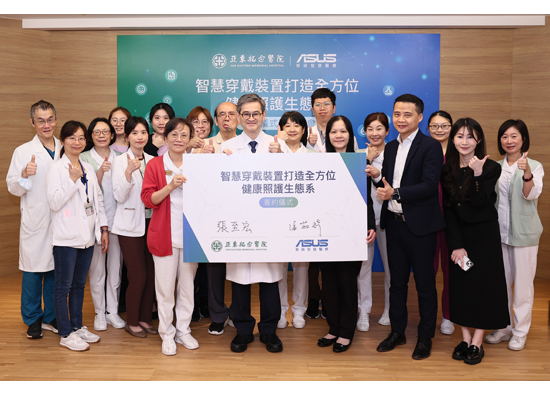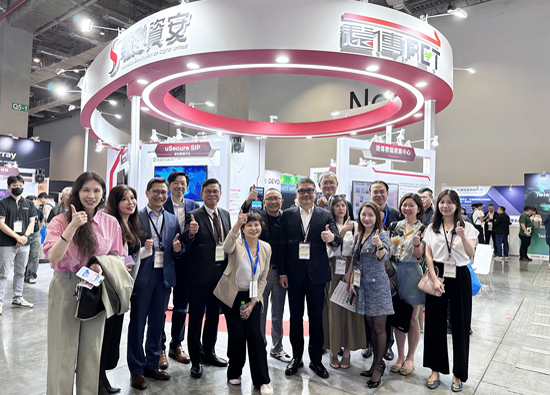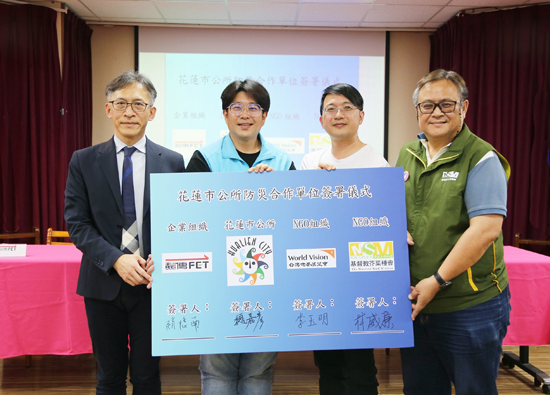06.2025 Group Briefing
Far Eastern Memorial Hospital collaborates with Asus to create a smart wearable healthcare ecosystem
Far Eastern Memorial Hospital / Luo Yiyu



With the rapid development of digital healthcare and precision health management, smart wearable devices have become an essential tool for individuals to take charge of their health. On April 28, Far Eastern Memorial Hospital (FEMH) and ASUS announced a strategic partnership to integrate ASUS wearable technology into clinical care, case management, and telemedicine. This collaboration aims to create a smart healthcare ecosystem centered on preventive medicine, intelligent care, and personalized health management, marking a new milestone in nationwide health promotion.
Wearable Devices Enhance Health Literacy and Open a New Era of Patient Empowerment
Dr. Chang Chih-Hung, Vice Superintendent of FEMH, emphasized that this collaboration represents a key step in the hospital's digital transformation. Real-time physiological data collected via wearable devices can enhance care efficiency and patient safety while extending services beyond hospital walls to include sub-healthy individuals, patients with chronic diseases, and high-risk populations. He highlighted the value of AI in adding value, reducing workload, increasing efficiency, and minimizing errors. The true potential of smart healthcare lies not only in technology, but in its ability to meet the health needs of individuals and society. Through this partnership, FEMH aims to go beyond treating illness by empowering individuals to manage their own health more effectively.
A New Model for Health Monitoring Supports Nurses and Patients Alike
Wearable devices show great promise in clinical applications. Liu Tsai-Wen, Director of Nursing at FEMH, explained that as society ages, the gap between healthcare staffing and patient needs is widening. Wearables can measure heart rate, blood pressure, and oxygen saturation in real time, helping to automate the monitoring of hospitalized patients. When paired with an alert system for abnormal readings, these devices can significantly enhance patient safety and care quality. Particularly during nighttime care, vital signs can be monitored without disturbing patient sleep, reducing nurses' workload while improving patients' sleep quality.
“SafeLink” Program: Borderless Technology-Driven Healthcare
Dr. Wu Yen-Wen, Director of the Cardiovascular Medicine Center, shared practical insights into managing chronic and high-risk patients. FEMH previously collaborated with tech companies and the New Taipei City Fire Department to implement the "SafeLink" program. This initiative integrates wearable devices with emergency systems and connects with post-discharge care programs for acute myocardial infarction and heart failure. The devices enable 3- to 6-month remote health monitoring after surgery. In emergencies such as arrhythmias or cardiac arrest, the device sends an alert to the hospital's case management platform and the fire department's command center to trigger a rapid emergency response, maximizing the critical golden hour. To date, 123 participants have undergone long-term monitoring, with data accuracy matching traditional ECGs at 99%. This technology not only benefits high-risk individuals but can also be extended to elderly people living alone or in remote areas, promoting equitable access to smart care. FEMH hopes to expand the “SafeLink” platform in partnership with ASUS to support more wearable brands and models for broader integration.
From Treatment to Prevention: Personalized Health Management Begins
In the realm of personal health management, Dr. Lee Ai-Hsien, Director of the Health Management Center, noted that people today are increasingly health-conscious. Data collected by wearable devices, once analyzed and visualized, can generate personalized health insights and trend reports, helping users understand their physical condition and develop long-term healthy habits. This shift from “treatment” to “prevention” forms the foundation of precision medicine and personalized health management.
Transforming Healthcare: Shaping the Future of Wellness
The cross-industry collaboration between FEMH and ASUS not only demonstrates the innovative fusion of healthcare and technology but also expands the potential applications of wearables in clinical and community settings. Both parties will continue to advance research and field testing to upgrade smart medical services comprehensively. Vice Superintendent Chang emphasized that modern healthcare is no longer confined to hospitals—it must be integrated into individuals’ everyday lives. FEMH will continue working with partners across sectors to build a holistic and people-centered care model, covering every stage from disease prevention and clinical treatment to health promotion.
#




















